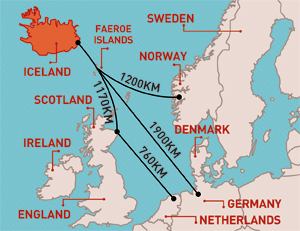
Geothermal expertise and energy could soon start flowing from Iceland to the U.K. Establishing what would be the world's longest subsea, high-voltage direct-current power line is among areas of joint interest covered by a memorandum of understanding signed near Reykjavik by government ministers of both countries.
The government of Iceland and private-sector groups already have studied various cable options to Europe. The proposal with the shortest length would cover 1,000 kilometers at a depth reaching one kilometer and a power capacity of up to 1,000 MW. Currently, the longest subsea cable is the 580-km, 700-MW NorNed link, between Norway and the Netherlands; it has been in operation for four years.
Developing a power line to Europe would represent "one of the biggest opportunities Iceland has faced," the chief executive officer of state-owned power company Landsvirkjun, Hörður Arnarson, said at the company's recent annual general meeting. More than a quarter of the electricity used by the 310,000 residents of the volcanic island in the North Atlantic is generated using geothermal heat, according to Landsvirkjun data.
Though the U.K. invested in geothermal research in the 1970s, the technology so far has been regarded as being not economically feasible. But now that the government is striving to meet greenhouse-gas emission targets, geothermal energy has once again become a hot topic.
Geothermal plants in the U.K. could potentially generate five million megawatt hours (MWh) of electricity and 32 million MWh of heat by 2030, according to a report published in May by engineering consultant Sinclair Knight Merz Pty Ltd., Sydney, Australia. Tim Jackson, a senior geothermal engineer, puts the U.K.'s potential capacity at 9,500 MWe (megawatt electrical) and 100,000 MWth (megawatt thermal) “for projects with a 25-year lifetime.”
With government backing, the small company EGS Energy Ltd., Penzance, is developing plans for the U.K.'s first geothermal electricity plant. Rated at about 4 MWe, the project would serve the 21,000-sq-m plant-filled greenhouse domes of the Eden Project and several thousand nearby homes in St Austell, Cornwall.
Among other projects being partially funded by the U.K. Dept. of Energy and Climate Change is a 2,000-meter-deep borehole at the site of an old brewery at Newcastle University, Newcastle-upon-Tyne, in northeast England.
Researchers at Newcastle University drilled the hole early in 2011 and started tests in November. The water temperature at the base of the borehole was "higher than we'd dared to hope," reported Paul Younger, director of the Newcastle Institute for Research on Sustainability (http://www.ncl.ac.uk/sustainability/initiatives/Borehole.htm).


Post a comment to this article
Report Abusive Comment